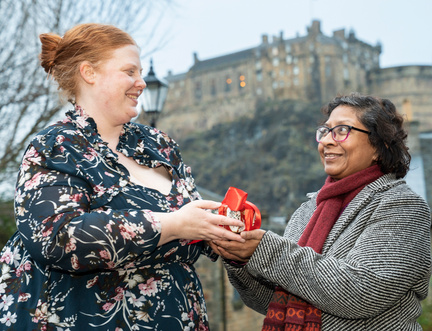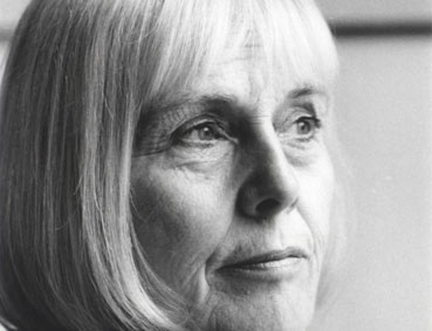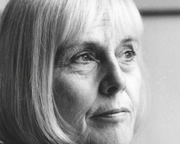Other Times, Other Places
By Joan Lingard
We have commissioned a new piece of writing from fifty leading authors on the theme of 'Elsewhere' - read on for Joan Lingard's contribution.
My husband's brother picks us up in the car bought for him by his mother in Toronto. We are going first to the outskirts of the city, to a Soviet-style housing scheme. My brother-in-law wants to show us his home. Before we start to climb the four flights of unlit stairs he removes the window-wipers from his car. One cannot be too careful. They will steal anything round here. And who can blame them when they have so little? My husband warns me to stay in close to the wall. The handrail is missing in places. A skylight provides only a little illumination on the top landing. When we reach it my eye is drawn to a jagged hole in the wall. My brother-in-law shrugs. There was a shooting last weekend. He thinks his neighbours could be drug-runners.
His wife is waiting to receive us. We present our gifts. Small, decorated tins of tea, packets of women's tights, various other items of clothing, bars of soap, pairs of Clarks real leather shoes for the grandchildren, a couple of ghetto-blasters. All excellent articles for bartering. My husband's suitcase is empty now. We can leave that with them too.
They show us their two-roomed apartment and tell us how they shared the bedroom with her father for many years until he died, while their two daughters slept in the living room. They have no hot water. They live frugally, on the state pension, and have no savings. He was an anaesthetist at the children's hospital before he retired; she was a doctor, a specialist in radiography. They could have earned more driving tractors.
After we have drunk our tea we set out. We are going on an expedition into the country. We travel slowly. The roads are full of potholes. There are few cars and no buses. In the fields tractors rust, but it is summer and the gentle rolling countryside looks benign and beautiful. The birch trees are in full shimmering leaf, reminding us of our beautiful Speyside. The hedgerows are speckled with flowers of many colours. The people love nature. They revere it. When the family came to meet our train from Leningrad their arms were full of flowers.
At midday we pull up in front of a collective farm. My sister-in-law consults with me in poor German. Neither of us speaks the other's language but we manage. I open my bag and she selects a tin of tea. We wait on the sunny roadway while she disappears round the back of a large wooden building. When she returns she is smiling. We can have lunch! We have not seen any restaurants since we left the city.
We are seated at a long wooden trestle table. The farm workers are already eating, dipping their chunks of bread into bowls of thick stew. They seem not to be unduly curious about the new arrivals. My sister-in-law insists on serving us. We are treasured visitors from the luxurious west and we cannot be expected to queue up with farm workers for our lunch.
After we have eaten and before we travel further we must visit the facilities. My sister-in-law apologises profusely before we reach them. They can be smelt on approach, reminding me of campsites in rural France where we spent summers with the children in years past. I used to hose down the latrines before I let the children set foot in them. Here, there are no hoses. When I come out I wipe my shoes on the grass. My sister-in-law apologises again. I tell her not to worry, it is not a problem.
We travel on.
Our destination is no more than sixty or so kilometres from the city but, on arrival, we feel as if we have travelled a long way. We come first to a small town. Some of its old houses are wooden and badly in need of repair, though still occupied. The whole country is in need of repair.
The house stands three kilometres outside the town. The childhood house of my husband, designed by his father, who, until the Second World War, was City Architect of the capital. After the first Soviet invasion he was denounced as an Enemy of the People, like anyone in a position of authority or who owned land. He was forced to go into hiding. My sister-in-law's father, a farmer, was exiled to Siberia. In 1944 my father-in-law took the decision to flee the country, taking with him his wife and four children. They became refugees, blown across Europe, like leaves in the wind, hither and thither, until they made landfall in Canada four years later. The eldest son, who is with us today, was unable to escape and ended up a prisoner on the island of Sakhalin.
I stand at the gate and look at the house, a beautiful, imposing building of yellowish stone, with a semicircular balcony and a colonnaded portico beneath. The garden is overgrown, which distresses my sister-in-law, who loves to grow flowers and vegetables. During the occupation the house was commandeered and given over to six families. There are only three there now, one on each floor. My brother-in-law does not know the inhabitants of the basement and ground floor but he is acquainted with the elderly husband and wife on the first floor. The husband taught mathematics at the local high school while his wife was a dentist. They have remained there throughout.
They welcome us warmly. He takes my husband into another room and shows him a chair. He says that he thinks my father-in-law designed it and would my husband like to have it? He is a little embarrassed. My husband takes the chair but later gives it to his brother. We go into their father's studio. It is crammed with furniture from various rooms in the house and reminds me of an auction sale room. In the dining room murals by one of the country's leading artists grace the walls.
We go into the sitting room and are offered coffee, along with birch juice and dandelion wine, both home-made, and ginger biscuits. As we raise our glasses to wish each other good health my husband murmurs to me that these were his mother's sherry glasses. They are delicate and finely made. I feel a shiver up my spine but when I look sideways at my husband I see that he is calmly sipping his wine. They have endured much more than the loss of sherry glasses in their lives.
After we leave the house we visit the churchyard, where grandparents have been buried. It is a real country churchyard, with simple headstones and flowers growing around the graves.
We drive back to the city in the early evening. The western sun mellows the countryside, turning the birch leaves to golden. The birds are in full-throated song. Before my brother-in-law drops us off at our hotel we stop at the Freedom Monument. A newly-wed couple has also stopped. They get out of their car and lay a wreath of flowers at the foot of the monument under the stony gaze of two armed Russian soldiers. The people are becoming bolder. There is a whiff of revolution in the air.
Our hotel is a soulless, newly-built high-rise, but adequate, and the toilets flush. We take the lift to the eleventh floor, gliding smoothly past the second, where it never stops. On that floor the blinds are permanently drawn, behind which men and women perform their secret service activities. When we emerge from the lift we pass the two women seated at a desk who stare impassively through us and we through them. Our return has been noted. We go into our room. We do not speak of our day in the country, of our lunchtime visit to the collective farm, or the house where my husband lived as a child. We have been warned. Remember, one cannot be too careful. There are bugs everywhere. My brother-in-law will only speak of his experiences on Sakhalin out in the air, away from walls.
That was 1989.
The hotel has since been modernised, westernised, and the windows on the second floor are no longer blinded. The city is alive with restaurants, slick cocktail bars and tourists who are free to come and go as they please.
My brother-in-law lies in the country churchyard; his widow lives in a city apartment. After the revolution the family claimed back the house and my brother-in-law and his wife lived there for some years, enjoying the garden and the peace of the countryside. The lodgers remained in the basement and on the first floor. It was desperately cold in winter. Heating was inadequate. Pieces dropped off the balcony rail. The roof needed renewing. The family could not afford to renovate the house. It has now been sold, along with the valued murals and most of its contents, to a property speculator. I cannot help wondering if the sherry glasses were included in the price.
Copyright © 2010, Joan Lingard. All rights reserved.
Supported through the Scottish Government’s Edinburgh Festivals Expo Fund.
Look, Listen & Read
- 2025 Festival:
- 9-24 August
Latest News
 Communities Programme participants celebrate success of 2024
Communities Programme participants celebrate success of 2024





